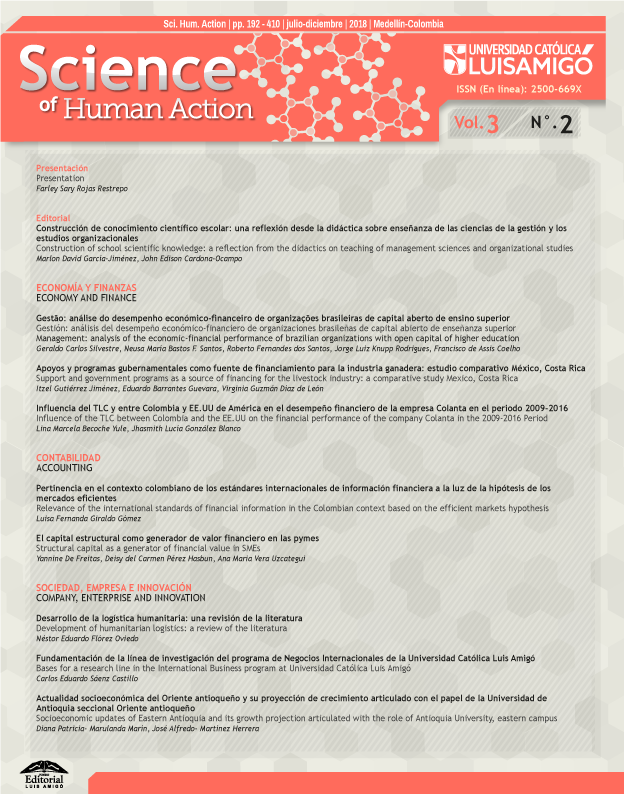Editorial
DOI:
https://doi.org/10.21501/2500-669X.2921Keywords:
Conocimiento Científico, Enseñanza, Didáctica, Estudios OrganizacionalesAbstract
Uno de los problemas latentes de las publicaciones en ciencias económicas, administrativas y contables o bajo otra posición epistemológica, ciencias de la gestión y estudios organizacionales, es el alejamiento de la lectura de los productos de investigación científica, de los procesos de formación y desarrollo de aula en los programas pregraduales, lo que lleva a dimensionar un alejamiento de la ciencia erudita con la ciencia escolar en este tipo de programas académicos, generando un problema de engrosamiento del anaquel y el no crecimiento notorio de la actitud científica, en detrimento de la construcción de cultura académica en estos programas y de la misma construcción de conocimiento desde las bases estudiantiles.
Downloads
References
Acevedo-Díaz, J. A., Vázquez-Alonso, Á., Manassero-Mas, M. A., y Acevedo-Romero, P. (2007). Consensos sobre la naturaleza de la ciencia: fundamentos de una investigación empírica. Eureka, 4(1), 42-66. Recuperado de https://revistas.uca.es/index.php/eureka/article/view/3833/3410
Bahamonde, N. (2006). Los modelos de conocimiento científico escolar de un grupo de maestras de educación infantil: un punto de partido para la construcción de "islotes interdisciplinarios de racionalidad" y "razonabilidad" sobre la alimentación humana (Tesis doctoral). Barcelona: Universidad Autónoma de Barcelona.
Chavellard, Y., & Joshua, M. A. (1982). Un example d´ analyse de la transposition didactique. La notion de distance. Recherches en didatique des mathematiques, 3(2). Recuperado de http://rdm.penseesauvage.com/Un-exemple-d-analyse-de-la.html
García-Jiménez, M. D. (2016). Modelos de conocimiento científico escolar en un grupo de maestros de programas universitarios de Contaduría Pública. Sophia, 12(1), 85-105.
Izquierdo, M., Adúriz-Bravo, A., & Aliberas, J. (2004). Pensar, actuar i parlar a la classe de ciències. Per un ensenyament de les ciències racional i razonable. Cerdanyola: Servei Publicacions de la UAB.
Lugo-Morin, D. R. (2010). La construcción de conocimiento: Algunas reflexiones. Limite, 05(21), 59-75. Recuperado de http://limite.uta.cl/index.php/limite/article/view/96
Mosquera Suárez, C. J., & Furió- Más, C. (2008). El cambio didáctico en profesores universitarios de química a través de un programa de actividades basado en la enseñanza por investigación orientada. Didáctica de las ciencias experimentales y sociales, (22), 115-154.
Tamayo, Ó. E., y Orrego, M. (2005). Aportes de la naturaleza de la ciencia y del contenido pedagógico del conocimiento para el campo conceptual de la educación en ciencias. Educación y pedagogía, XVII(43), 13-25. Recuperado de http://aprendeenlinea.udea.edu.co/revistas/index.php/revistaeyp/article/view/6051
Vasquez Alonso, Á., & Manassero Mas, M. (2007). En defensa de las actitudes y emociones en la educación científica (II): Evidencias empíricas derivadas de la investigación. Eureka, 4(3), 417-441. Recuperado de https://revistas.uca.es/index.php/eureka/article/view/3785/3359
Vasquez Alonso, Á., & Manassero Mas, M. (2008). El declive de las actitudes hacia la ciencia de los estudiantes: Un indicador inquietante para la educación científica. Eureka, 5(3), 274-292. Recuperado de https://revistas.uca.es/index.php/eureka/article/view/3740/3317
Zambrano Hernandez, J. A. (2012). La enseñanza de la contabilidad en los libros de textos universitarios (1960-2008). Ibagué: Universidad del Tolima.
Downloads
Published
How to Cite
Issue
Section
License
PUBLICATIONS POLICY
• The author must send completed the declaration of transfer of economic rights and declaration of conflicts of interest, which will be provided by the management of the magazine. This document indicates the originality of the article, which is not published in another medium and that is not simultaneously postulated in another journal.
• The author will transfer all rights to the article to the journal Science Of Human Action.
• Once the evaluation of the article has begun, the authors agree not to withdraw it until the end of the process.
• The Science Of Human Action journal will submit the articles received for initial evaluation by the Editorial Committee, in case the Committee finds the material pertinent, it will be evaluated by two anonymous referees who will determine if it is publishable. If one referee approves and the other rejects it, a third party will be appointed.
• The address of Science Of Human Action will answer within a maximum of three (3) days about the receipt of the contribution received from the author.
• Printed items will not be received. All the proponents will have to send their writings through the e-mail of the magazine.
• Partial versions of the text will not be received, that is, those that are not structurally adjusted to the type of article.
• Once the article is sent, it is understood that the author authorizes the publication of these data.
• The reception of articles does not imply an obligation to publish them. The authors are directly responsible for the ideas, judgments and opinions expressed in the articles; in such a way that the content does not compromise the thinking of the Editorial Committee or the Institution.
• Once the article is submitted, it is understood that the author authorizes the publication of the data corresponding to the author's note.
• This is an open access journal that does not charge authors for either the editorial process or the publication. All costs of editorial production are assumed by the Luis Amigó Catholic University.
ETHICS OF PUBLICATION
• The Editorial Committee, by virtue of transparency in the processes, will ensure the academic quality of the journal.
• Causes of rejection are considered: plagiarism, adulteration, invention or falsification of content and author data, which are not original and unpublished.
• In no case, the journal's management will require the author to cite it or publish articles with conflicts of interest.
• If once the article is published: 1) the author discovers substantive errors that threaten the quality or scientificity, may request its removal or correction. 2) If a third party detects the error, it is the obligation of the author to retract immediately and proceed to the public removal or correction.


